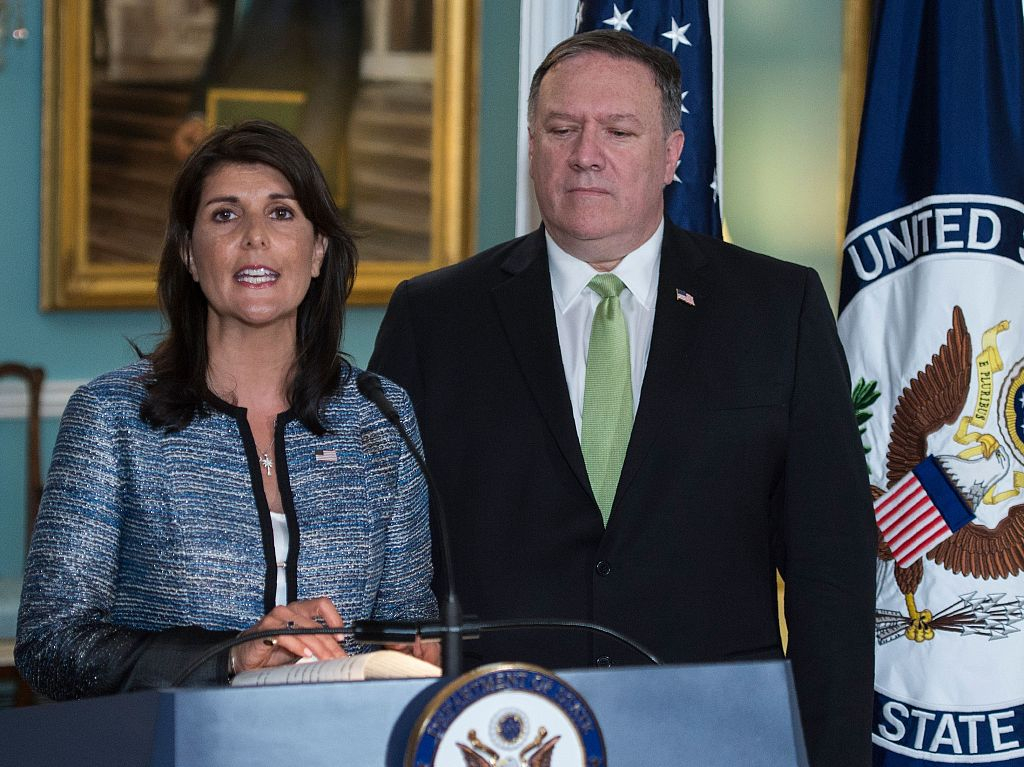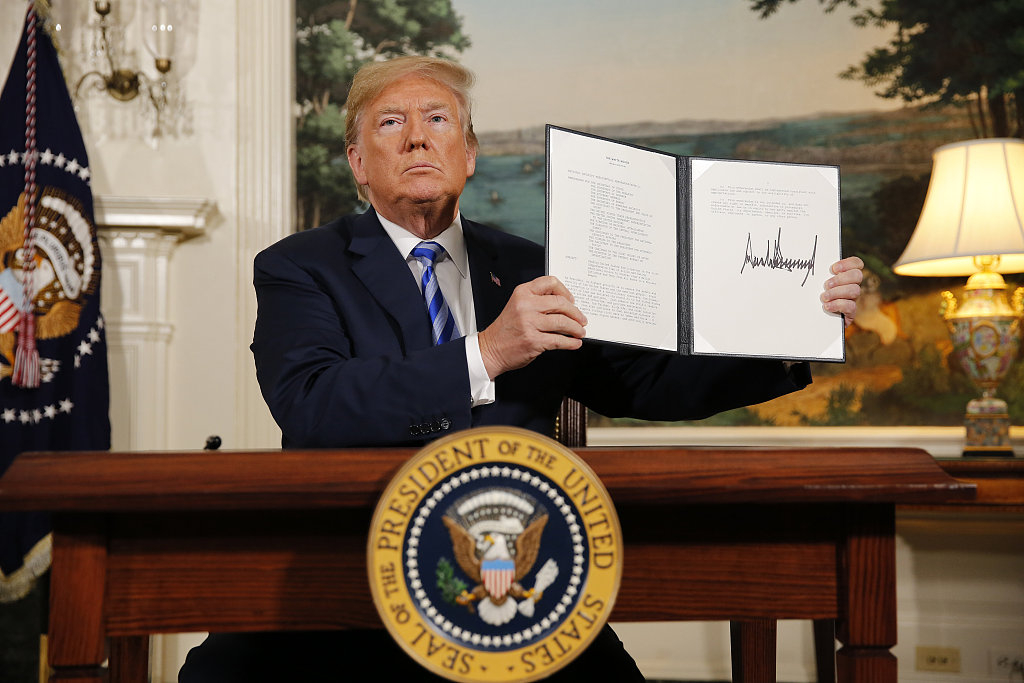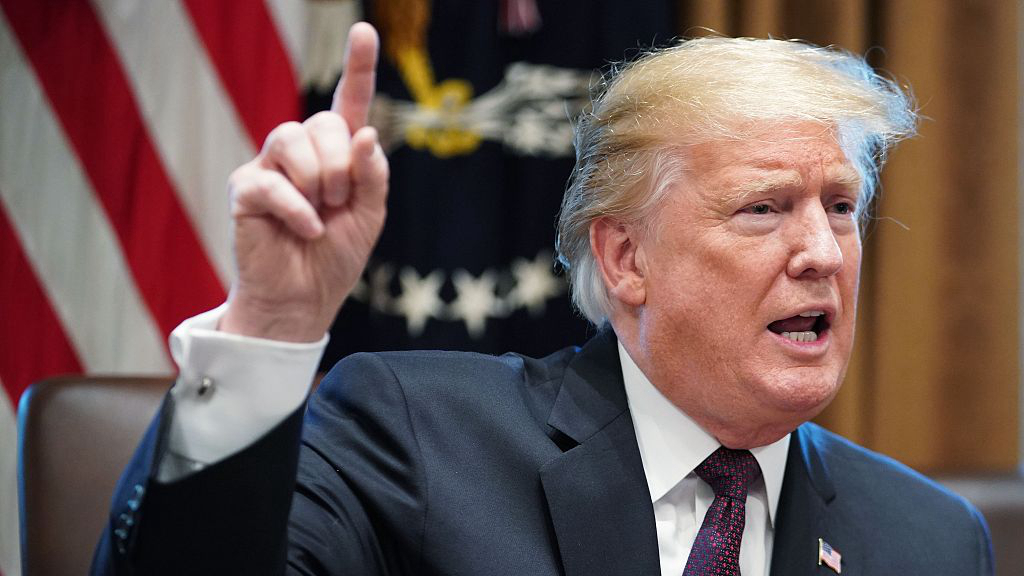Editor's Note: Bobby Naderi is a journalist, current affairs commentator, documentary filmmaker and member of the Writers Guild of Great Britain. The article reflects the author's opinion, and not necessarily the views of CGTN.
The United States is torching the rules-based international order and friends and foes bear the consequences.
The global sheriff is no longer playing the positive internationalist role it used to play in trade and finance, humanitarian assistance, security, environment, and human rights. This new policy has had profound effects on global security and prosperity.
Courtesy of the Trump administration, the U.S. has torn up many international pacts. It has walked out of the nuclear arms control treaty with Russia, called the Intermediate-Range Nuclear Forces treaty, even if it risks sparking a new nuclear arms race.
Other controversial moves include tearing up international treaties and institutions such as the Paris climate agreement; the Iran nuclear deal (JCPOA); the Trans-Pacific Partnership (TPP); the North American Free Trade Agreement (NAFTA); the UN cultural organization (UNESCO), the UN Human Rights Council (UNHRC), and the UN Relief and Works Agency (UNWRA).

U.S. Secretary of State Mike Pompeo looks on as U.S. Ambassador to the United Nation Nikki Haley announces that the U.S. is withdrawing from the UN Human Rights Council, at the U.S. Department of State in Washington, DC, June 19, 2018. /VCG Photo
U.S. Secretary of State Mike Pompeo looks on as U.S. Ambassador to the United Nation Nikki Haley announces that the U.S. is withdrawing from the UN Human Rights Council, at the U.S. Department of State in Washington, DC, June 19, 2018. /VCG Photo
There is more from Washington in this line. In an ever more forlorn endeavor, President Donald Trump has threatened further withdrawals and violations, with no remorse and no plans to change course. The global sheriff and his neocon followers have deliberately changed the overall character, purpose, and direction of U.S. foreign policy.
To this end, Trump cares little if in his ruinous trade war with China there are losers on both sides of the Pacific, or global markets grapple with a tariff war that seems to benefit no one or protectionism in the form of tariffs on Chinese goods is actually hurting the U.S. economy, companies, consumers, and farmers.
He likewise doesn't give a toss if the International Monetary Fund (IMF) is warning that new U.S.-China tariffs could sink business and financial market sentiment, derail global supply chains, and subtract the projected recovery in global growth.
Even if it's in no one's interest, the Trump administration is disrupting global technology networks by restricting the sale of U.S. technology to Huawei Technologies Co. on the false claims of national security and foreign policy interests.
Without offering an alternative, Washington is forcing allies and other countries to join in efforts to shut out the Chinese telecommunications company from advanced 5G networks, the next generation in mobile data infrastructure.
Regrettably, Trump's one-man foreign policy, executive orders, disruptions, and measures against the rules-based international order are not limited to technology transfer and trade war.

U.S. President Donald Trump makes a statement on the Joint Comprehensive Plan of Action regarding Iran in the Diplomatic Reception Room of the White House in Washington, DC, May 8, 2018. /VCG Photo
U.S. President Donald Trump makes a statement on the Joint Comprehensive Plan of Action regarding Iran in the Diplomatic Reception Room of the White House in Washington, DC, May 8, 2018. /VCG Photo
Under pressure from Washington, Japan and Russia are yet to formally end their World War Two hostilities. Japan refuses to conclude a peace treaty with Russia, which depends on the fate of the islands of the South Kuril Ridge.
Tokyo refuses to guarantee that after a deal is reached the islands won't be populated by U.S. military personnel. Japan has also rejected President Vladimir Putin's proposal to increase bilateral trade and investment.
In this hostile environment, if you think that's all there is to it, you are mistaken. The 11th Ministerial Meeting of the Arctic Council on May 6-7 in Rovaniemi, Finland, was all about "scientific collaboration, cultural matters, and environmental research trade" before the Trump administration pushed it off the cliff.
Secretary of State Mike Pompeo showed up and trashed the party by a brash speech plagued with lies and baseless accusations against Russia, China, and Arctic countries. He even threw the kitchen sink to make sure the participants didn't reach a formal Ministerial Declaration at the end of the long-anticipated meeting.
These are just some of the recent examples that discern how the Trump administration is doing everything it can to uptick the rules-based international order through diplomatic vandalism. They put in view how the U.S. has become a rogue state and trashed its own global leadership and engagement in international affairs.
To put the point mildly, the global sheriff is playing a confrontational role in the world, making sure countries do not get along with each other on any issue of international concern.

People hold signs in support of Meng Wanzhou, CFO of Huawei Technologies Co., outside of a bail hearing at the Supreme Court in Vancouver, British Columbia, Canada, December 11, 2018. /VCG Photo
People hold signs in support of Meng Wanzhou, CFO of Huawei Technologies Co., outside of a bail hearing at the Supreme Court in Vancouver, British Columbia, Canada, December 11, 2018. /VCG Photo
This provocative policy is designed to maintain unipolarity and prolong geopolitical tensions. The disorders and distrusts the core axis of this policy has created, or the way international institutions and treaties have been made obsolete, will only worsen in the years to come.
President Trump and his new neocon followers should take note: Those who sow the wind will reap the whirlwind. They should take this out of their heads that other countries won't adopt a similar confrontational strategy toward the U.S. and its wasteful agendas in trade, security, and technology.
It makes no sense for other countries to conduct their activities in accordance with international law, regional security arrangements, and trade agreements, if the same shared commitment doesn't exist in Washington.
In response to Trump's decision to bin the nuclear deal and impose sanctions, Iran has ended its compliance with two particular conditions of its 2015 nuclear deal.
Russia has slapped economic/financial sanctions on American businesses and officials and might restart low-yield nuclear tests. China has imposed tariffs on American goods and might cut off rare earth minerals exports to the U.S. as a countermeasure in the escalated trade conflict.
In response to Trump's Huawei ban, many countries in Europe have also said the Chinese telecommunications company is an asset, not a threat. France, the UK, Germany, Italy, Spain, and others have decided to embrace Huawei's 5G tech, concluding that they have a sovereign right to make their own decisions about how to deal with the Chinese telecom-equipment company.
In the Trump era, as it turned out, foreign policy changes along with circumstances. In most cases, many countries cannot control the behavior of the “tariff man” and his trade-war cabal, but they can always choose how they respond to it.
(If you want to contribute and have specific expertise, please contact us at opinions@cgtn.com.)





